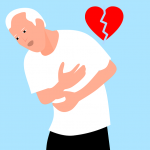Acid reflux is a common condition that affects millions of people worldwide. It occurs when stomach acid flows back up into the esophagus, causing discomfort and sometimes pain.
Acid reflux can be caused by a variety of factors, including diet, lifestyle, and medical conditions. Finding quick fixes for acid reflux is important to alleviate symptoms and prevent long-term damage to the esophagus.
What is Acid Reflux?
 Acid reflux, also known as gastroesophageal reflux disease (GERD), is a condition in which stomach acid flows back up into the esophagus. The esophagus is the tube that connects the mouth to the stomach. When acid from the stomach enters the esophagus, it can cause irritation and inflammation, leading to symptoms such as heartburn, regurgitation, and difficulty swallowing.
Acid reflux, also known as gastroesophageal reflux disease (GERD), is a condition in which stomach acid flows back up into the esophagus. The esophagus is the tube that connects the mouth to the stomach. When acid from the stomach enters the esophagus, it can cause irritation and inflammation, leading to symptoms such as heartburn, regurgitation, and difficulty swallowing.
Understanding how acid reflux occurs is important for finding quick fixes. Normally, a ring of muscle called the lower esophageal sphincter (LES) prevents stomach acid from flowing back up into the esophagus. However, if the LES is weakened or relaxed, it can allow acid to escape into the esophagus. This can be caused by factors such as obesity, pregnancy, smoking, and certain medications.
Causes of Acid Reflux
There are several common causes of acid reflux that can contribute to its occurrence. These include:
- Diet: Certain foods and drinks can trigger acid reflux symptoms, such as spicy or fatty foods, caffeine, alcohol, and citrus fruits.
- Lifestyle: Habits such as smoking, overeating, and lying down after eating can increase the risk of acid reflux.
- Medical conditions: Conditions such as hiatal hernia and gastroparesis can contribute to acid reflux.
- Medications: Certain medications such as aspirin and ibuprofen can irritate the lining of the esophagus and increase the risk of acid reflux.
Identifying the cause of acid reflux is important for finding quick fixes. By addressing the underlying cause, individuals can reduce their symptoms and prevent future occurrences.
Symptoms of Acid Reflux
The symptoms of acid reflux can vary from person to person, but common symptoms include:
- Heartburn: A burning sensation in the chest or throat.
- Regurgitation: The sensation of stomach acid or food coming back up into the mouth.
- Difficulty swallowing: A feeling of food getting stuck in the throat.
- Nausea: A feeling of queasiness or an upset stomach.
- Coughing or wheezing: These symptoms can occur if stomach acid irritates the lungs.
Recognizing these symptoms is important for finding quick fixes. By identifying when symptoms occur and what triggers them, individuals can take steps to alleviate their discomfort.
Diet and Lifestyle Changes to Reduce Acid Reflux
Making dietary and lifestyle changes is one of the most effective ways to reduce acid reflux symptoms. Some changes that can be made include:
- Avoiding trigger foods and drinks: Foods and drinks that trigger acid reflux should be avoided, such as spicy or fatty foods, caffeine, alcohol, and citrus fruits.
- Eating smaller meals: Overeating can increase the risk of acid reflux, so eating smaller meals throughout the day can help.
- Not lying down after eating: Waiting at least 3 hours after eating before lying down can help prevent acid reflux.
- Losing weight: Obesity is a common cause of acid reflux, so losing weight can help reduce symptoms.
- Quitting smoking: Smoking weakens the LES and increases the risk of acid reflux.
Making these changes is important for finding quick fixes. By adopting healthier habits, individuals can reduce their symptoms and improve their overall health.
Over-the-Counter Medications for Acid Reflux
Over-the-counter medications are available to help alleviate acid reflux symptoms. Some common medications include:
- Antacids: These medications neutralize stomach acid and can provide quick relief.
- H2 blockers: These medications reduce the amount of acid produced by the stomach and can provide longer-lasting relief.
- Proton pump inhibitors (PPIs): These medications block the production of acid in the stomach and can provide long-term relief.
Using these medications is important for finding quick fixes. However, it is important to talk to a healthcare provider before starting any new medication.
Natural Remedies for Acid Reflux
Natural remedies can also be effective in reducing acid reflux symptoms. Some remedies that may help include:
– Ginger: Ginger has anti-inflammatory properties that can help reduce inflammation in the esophagus.
– Aloe vera juice: Aloe vera juice can help soothe the lining of the esophagus and reduce inflammation.
– Apple cider vinegar: Although acidic, apple cider vinegar can help balance the pH levels in the stomach and reduce acid reflux symptoms.
Trying natural remedies is important for finding quick fixes. However, it is important to talk to a healthcare provider before trying any new remedy.
When to See a Doctor for Acid Reflux
While most cases of acid reflux can be managed with lifestyle changes and over-the-counter medications, some cases may require medical attention. It is important to see a doctor if:
- Symptoms persist despite making dietary and lifestyle changes
- Symptoms interfere with daily activities
- Symptoms are accompanied by chest pain or difficulty breathing
- There is blood in vomit or stool
Seeking medical attention is important for finding quick fixes. A healthcare provider can help diagnose the underlying cause of acid reflux and recommend appropriate treatment options.
Acid reflux is a common condition that affects many people worldwide. Finding quick fixes for acid reflux is important to alleviate symptoms and prevent long-term damage to the esophagus.
By understanding what causes acid reflux, recognizing symptoms, making dietary and lifestyle changes, using over-the-counter medications, trying natural remedies, and seeking medical attention when necessary, individuals can find the right quick fix for their acid reflux.








